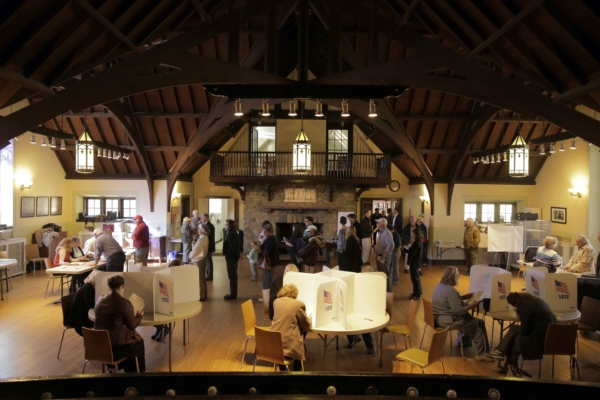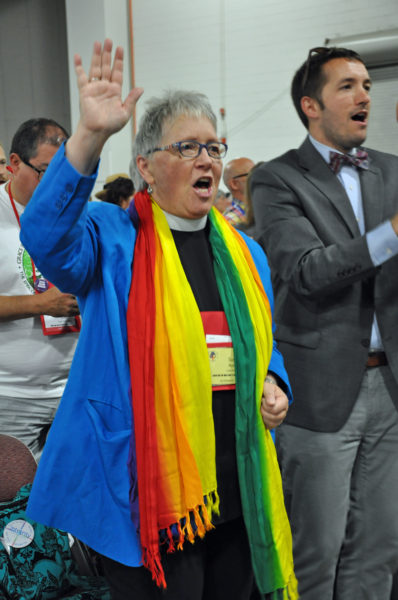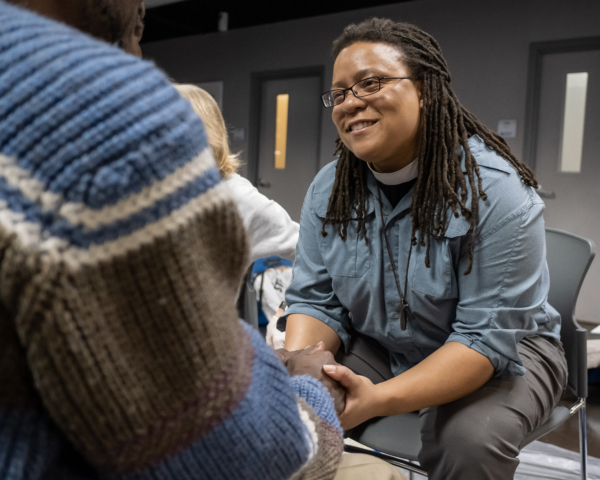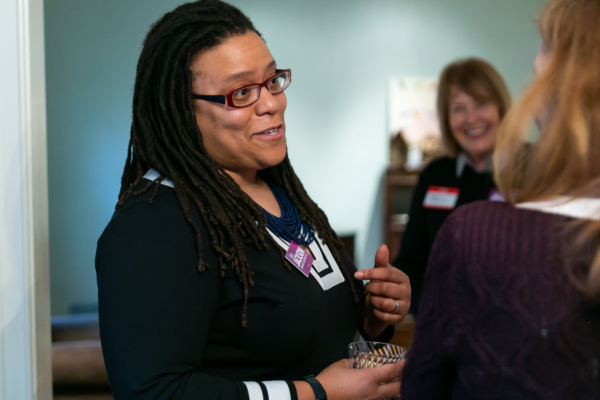With the 2020 election approaching, how political can clergy get?While some steer clear, others speak out – and even run for office themselvesPosted Sep 30, 2020 |
|
[Episcopal News Service] As vicar of Church of the Common Ground, a street-based ministry, the Rev. Kim Jackson serves homeless and vulnerable people living on the streets of Atlanta, Georgia.
This coming January, she hopes to serve them in an additional setting: the Georgia Capitol, as a member of the state Senate.
“About half the folks that attend my service on Sundays sleep outside of the Capitol during the week – they sleep across the street from the Capitol,” she told Episcopal News Service. “I will serve outside of the Capitol with people who sleep out there, and I will go inside and fight like hell on behalf of them.”
Jackson is running as a Democrat in a reliably blue district in Atlanta’s eastern suburbs. The seat is currently held by Senate Democratic Leader Steve Henson, who is not seeking reelection. If she wins, she will be the first openly lesbian state senator in Georgia history.
Jackson, who since age 13 has wanted to be both a pastor and a politician, said the decision to run was “more a question of how do I do this or when do I do this, not will I do this.” She was inspired by other clergy members who have served in office, like the late U.S. Rep. John Lewis, an ordained Baptist minister who served Georgia’s 5th Congressional District, including much of Atlanta, and the Rev. Clementa Pinckney, the South Carolina state senator who also served as pastor of Mother Emanuel African Methodist Episcopal Church in Charleston, where he and eight others were killed by a white supremacist in 2015.
Jackson, who was also born in South Carolina, described learning about Pinckney’s life as a “pivotal moment” for her.
“That reminded me that I was in the South and that this was possible – that you could be a state senator who served a church … and that there was room, particularly in the Black tradition, for one to do both of those things.”
A former associate rector at All Saints’ Episcopal Church in downtown Atlanta, Jackson also got advice from three All Saints’ parishioners who serve in the Georgia Legislature. She sees running for office as “an extension of [her] ministry” with vulnerable people on the streets of Atlanta, for whom political decisions can have major, immediate impacts. If elected, she would continue to serve Common Ground “because these two things are intertwined,” she told ENS.
“In the congregation that I serve, the policies that we make around issues of affordable housing, around criminal justice and reentry – those policies make a difference in their lives every single day. So, yes, we talk about those things,” Jackson said.
She got Atlanta Bishop Rob Wright’s approval before running and does not campaign during services. Still, she has found it hard to separate Kim Jackson the priest from Kim Jackson the candidate.
“I am running as Kim Jackson, not the Rev. Kim Jackson,” she told ENS. “And I did that intentionally because a year ago, I thought that those two things could be separated out. But I will say, a year into it, that that is not possible. People know me as Reverend Kim, and whether I am stumping for my campaign or standing up to deliver a homily, I am Reverend Kim, and my congregants are extraordinarily proud of the fact that I am running.”
Jackson’s run for office does not violate any law or any church canon, and though it is unusual, it’s not unprecedented. Former three-term U.S. Sen. John Danforth, a Missouri Republican, was also an Episcopal priest, though he never served a parish.
Jackson’s race is not particularly heated, but the simultaneous U.S. Senate and presidential elections are, and although the law is clear on what clergy can and cannot say from the pulpit, some clergy say it’s hard to know where the line is when it comes to social media. While some Episcopalians see political engagement — especially in a presidential election of unprecedented importance — as a moral imperative, others firmly believe in keeping religion out of politics and vice versa. That’s created a moral and legal quandary for some clergy as they wade through the swamp of social media: Exactly how political can they get? Do endorsements cross the line? And is it possible to separate their personal politics from their clerical role?
There are countless complicating factors, but there are some basic standards that apply to all churches; the Internal Revenue Service’s regulations governing tax-exempt organizations, often referred to as the Johnson Amendment, prohibit churches from participating in political campaigns, as Presiding Bishop Michael Curry explained in a sermon during the House of Bishops meeting on Sept. 16:
“The Episcopal Church does not endorse, support, or oppose political candidates for elected office. And there is good reason for that. First, in the United States, tax-exempt, religious and charitable organizations are by law prohibited from such endorsement, support or opposition to candidates,” Curry said.
However, Curry added, that does not mean Episcopalians – even clergy – should not be publicly involved in political discussions. In fact, he suggested, civic engagement is part of living out the Christian faith. The key, he said, is not to cling to partisan divisions, but rather to follow one’s conscience and look to the examples of Jesus’ public ministry.
“There are good and faithful followers of Jesus Christ who are Episcopalian. Some are Republican, some are Democrat, some are independents, some liberal, some centrist, some conservative. And just as we must respect the right of every citizen to cast his or her own vote according to the dictates of their conscience, so we must do so in the church,” Curry said. “But it’s important to remember that partisan neutrality does not mean moral neutrality.”
That idea was further discussed during a webinar hosted by The Episcopal Church’s Office of Social Justice and Advocacy Engagement on Sept. 30 titled “From the Pew to the Public Square: Preaching, Politics, and Justice.” One of the featured speakers, the Rev. Mark Jefferson of Virginia Theological Seminary, encouraged attendees not to be shy about taking on political topics, but not to latch onto partisan divisions either. Political labels, he said, may be easy to define, but they do not line up with Jesus’ ministry.
Preachers, Jefferson said, should avoid “engaging in the definitions that envelop our world: Democrats, Republicans. … All those things are being called into question by the Gospel. Jesus calls all these structures into question.”
Clergy who choose to wade into political issues must proceed with caution because of legal and practical implications. The Johnson Amendment remains on the books and in effect, according to the Justice Department, despite President Donald Trump’s false claims that he “got rid of it” with an executive order in 2017.

People vote in the U.S. presidential election at Grace Episcopal Church in The Plains, Virginia, on Nov. 8, 2016. Photo: Joshua Roberts/Reuters
The Episcopal Church’s Washington, D.C.-based Office of Government Relations, which advocates for nonpartisan policy positions adopted by General Convention, suggests that if clergy endorse candidates, they should do so in their personal capacity and make it clear that they are not speaking on behalf of any institution. It also offers the Vote Faithfully Election Engagement Toolkit to help churches discern what they can and cannot do.
But when it comes to social media, the line between personal and institutional is sometimes unclear. Although some clergy may see a clear line between Twitter and the pulpit, others may see Twitter as a pulpit. Dioceses have come up with different approaches to political statements on social media, but many have reached a similar conclusion: It’s best not to address political specifics on social media, but if you do, keep it on your personal account.
Christopher Hayes, chancellor for the Diocese of California, says churches are still struggling to adapt to the gray area that social media presents. In the past, it was much easier to differentiate the use of personal resources and church resources. Now, he says, it’s best to make that separation explicit.
“I would strongly recommend to clergy that they have a separate personal social media account from any account that they use for official church purposes,” he told ENS, “so that they can maintain a separation that will allow them to participate, if they wish, in political discussions online without involving the resources of their church and creating questions about whether the church has been involved in a political campaign.”
But even though that may prevent some of the more serious legal problems, clergy who are politically outspoken are still taking a risk, Hayes said.
“I think most clergy are pretty well aware that entirely aside from the tax exemption issues, it can be potentially alienating to some segment of their communities for them to be involved in a way that even a minority of their congregation might disagree with.”
The Rev. Joe Jenney, who serves St. Andrew’s by the Lake in Harrisville, Michigan, says he always keeps politics outside the church door.
“I would absolutely never endorse any candidate or party in my church,” Jenney said. “My congregation knows I am a conservative, and I have private political discussions with both the liberals and the conservatives in my congregation. But we don’t try to convince each other to change views.”
On his personal social media pages, though, Jenney is open about his political convictions.
“I know members of my congregation see my posts and that’s fine,” he told ENS. “I respect their views and hope they respect mine. I just never want to express political views in my church except in private one-on-one conversations.”
The Rev. Susan Russell, assisting priest at All Saints Church in Pasadena, California, sees it differently; she hopes that by freely sharing her political views, she can build bridges across partisan divisions instead of deepening them. Russell is known for her outspoken presence on social media; on her Twitter account, she frequently criticizes Trump and Republicans and promotes Democrats “because at this point, the values that I’m seeing from that political party align with what I believe [is] how I’m supposed to live out my faith in the world,” she said.
For Russell, expressing political convictions in this moment is a matter of personal integrity and a way to model civil discourse. She also serves as canon for engagement across difference in the Diocese of Los Angeles – a position established as part of a diocesan initiative to bridge societal differences in 2019 – and finds it unhelpful to shy away from any talk of politics.
“I think it’s important for me to be willing to talk about what I believe and why I believe it in order to model how it’s possible, regardless of where you stand on an issue or a candidate … that we can have respectful dialogue across those differences,” she told ENS. “How do we demonstrate that it’s possible to talk across difference if we’re not willing to articulate what those differences are?”

The Rev. Susan Russell celebrates the U.S. Supreme Court ruling on same-sex marriage on June 26, 2015, in the General Convention worship hall before the daily Eucharist. Photo: Mary Frances Schjonberg/Episcopal News Service
Still, she says she follows All Saints’ internal guidelines about not using church platforms to advocate for personal views. In one of its few instances of action on the Johnson Amendment, the IRS investigated All Saints over a sermon given by a former rector two days before the 2004 presidential election, in which he discussed Christian approaches to voting but did not endorse a candidate.
“I would never preach about a candidate,” she said. “We do not allow electioneering at All Saints in any way on any partisan issues. We do take positions on initiatives and propositions and will continue to do so. I think there is an important bright line in terms of advocating from the pulpit or through the institutional church on a candidate because that gets us into a whole different dark place of having organized religion co-opted for partisan politics.”
Russell is one of a number of priests on Twitter who regularly express strong political opinions; while some do not include their parishes and titles in their bios, others do. Some make it explicitly clear that they are only expressing personal views, while others mix political statements and theological ones. And although all clergy must follow the IRS regulations, some must abide by diocesan rules as well.
Some dioceses – like Rochester and Southwest Florida – include provisions on political speech on social media in their diocesan communications policies. But many don’t have hard and fast rules.
The Rev. Dorothy Massey “d’Rue” Hazel, canon for vision and ministry development in the Diocese of Upper South Carolina, says her diocese has no specific policy on political statements on social media, but treats these things on a case-by-case basis. Personally, Hazel thinks it’s wise for clergy to avoid them, whether on personal or official accounts.
“If an account is private, what does that mean? Does it mean that just the people you like in the church are part of that or people who aren’t even involved in the church are a part of that?” she said, adding that whenever she posts something that could be considered political, she includes a link to The Episcopal Church’s official position on the subject.
The Diocese of Olympia is an example of a diocese that does have a policy about getting political online. Diocesan staff may not use official email accounts to participate in any political campaign for or against a particular candidate or promote “personal positions or agenda not associated with one’s position as an employee of the diocese.” In the diocese’s social media guidelines, users of accounts that represent the diocese or its congregations are urged to avoid those same topics.
Josh Hornbeck, the diocese’s canon missioner for communications, says those social media guidelines are “not hard and fast rules for what they can and cannot say on social media,” but principles to keep in mind.
“You are still, even in your personal life, you’re still a representative of the diocese, you’re still a representative of your church,” Hornbeck tells clergy. “And always be aware of that. [But] we don’t try to police that. We don’t try to overly enforce any kind of censorship.”
Not only would that not be feasible, Hornbeck said, it hasn’t been necessary. Though “tensions have been high” at the intersection of faith and politics since 2016, Hornbeck said he could only recall one instance in which a clergy member crossed the line.
“It’s not really a huge issue for us,” he said.
The diocese itself has gotten involved in politics, suing the federal government over the Trump administration’s refugee restrictions, which had impacted the local refugee resettlement office. Though the diocese got complaints about being too political, Hornbeck said the diocese does not want to overly restrict political engagement because, “from the beginning, our faith is political.”
“The things that [Jesus] was doing were political in their day,” he said. “So, climate change – of course, it’s a political issue. Issues of poverty are political issues. We did a video for Transgender Remembrance Day, and that is a political issue for some people. For us, it’s an issue of people.”
– Egan Millard is an assistant editor and reporter for Episcopal News Service. He can be reached at emillard@episcopalchurch.org.



Social Menu